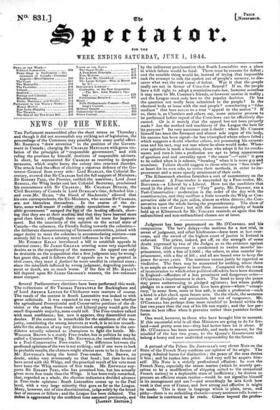Judgment has been pronounced on Mr. O'CONNELL and his companions.
The law's delays—the motions for a new trial, in arrest of judgment, and other hindrances—have been at last over- come, and the award of the highest court of justice in Ireland is enforced. The priest, indeed, got off, on the strength of some doubt expressed by two of the Judges as to the evidence against him. The chief traverser is condemned to twelve months' im- prisonment, with a fine of 2,0001.; the others, to nine months im- prisonment, with a fine of 501.; and all are bound over to keep the peace for seven }ears. The sentence cannot justly be regarded as vindictive. The fines may be accounted for nothing, where there is so ample an exchequer to bear them. Compared with the terms of incarceration to which other political offenders have been doomed. in England—offenders of a less prominent and dangerous order—• O'CONNELL'S imprisonment is short. The bond to keep the peace may prove embarrassing to pledged agitators ; but where public pledges to a career of agitation have been given—where " conspi- racy," in some form, more or less safe, is made a profession—such a bond is a fair check upon future acts. On the whole, the sentence is one of discipline and precaution, but not of vengeance. Mr. O'CONNELL has perhaps done more mischief to Ireland within the last two years than the rest of his life can repair; and the law per- forms its best office when it prevents rather than punishes further harm.
One word, however, to those who have brought him to account. If this successful trial is all that Ministers are going to do for Ire- land—and pretty soon too—they had better have let it alone. If Mr. O'CONNELL has been answerable, and made to answer, for the mischief of the last two years, to the Queen's Government will belong a heavy and now undivided responsibility for the future.


























